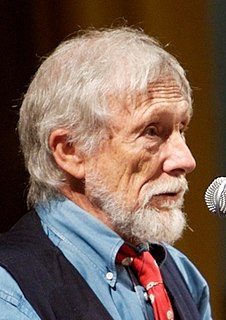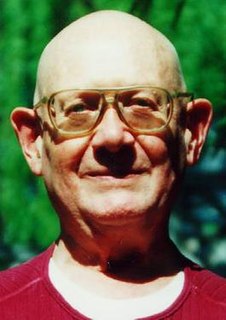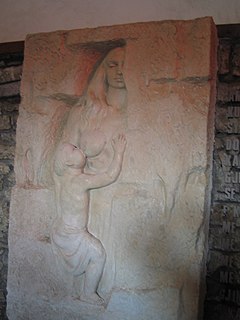
An epic poem is a lengthy narrative poem, ordinarily involving a time beyond living memory in which occurred the extraordinary doings of the extraordinary people who, in dealings with the gods or other superhuman forces, gave shape to the mortal universe for their descendants, the poet and their audience, to understand themselves as a people or nation.

Gary Snyder is an American man of letters. Perhaps best known as a poet, he is also an essayist, lecturer, and environmental activist with anarchoprimitivist leanings. He has been described as the "poet laureate of Deep Ecology". Snyder is a winner of a Pulitzer Prize for Poetry and the American Book Award. His work, in his various roles, reflects an immersion in both Buddhist spirituality and nature. He has translated literature into English from ancient Chinese and modern Japanese. For many years, Snyder was an academic at the University of California, Davis and for a time served as a member of the California Arts Council.

Gilgamesh was a hero in ancient Mesopotamian mythology and the protagonist of the Epic of Gilgamesh, an epic poem written in Akkadian during the late 2nd millennium BC. He was possibly a historical king of the Sumerian city-state of Uruk, who was posthumously deified. His rule probably would have taken place sometime in the beginning of the Early Dynastic Period (Mesopotamia), c. 2900 – 2350 BC, though he became a major figure in Sumerian legend during the Third Dynasty of Ur.

Homer was an ancient Greek author and epic poet. He is the reputed author of the Iliad and the Odyssey, the two epic poems that are the foundational works of ancient Greek literature. He is regarded as one of the greatest and most influential authors of all time.

The Epic of Gilgamesh is an epic poem from ancient Mesopotamia, regarded as the earliest surviving notable literature and the second oldest religious text, after the Pyramid Texts. The literary history of Gilgamesh begins with five Sumerian poems about Bilgamesh, king of Uruk, dating from the Third Dynasty of Ur. These independent stories were later used as source material for a combined epic in Akkadian. The first surviving version of this combined epic, known as the "Old Babylonian" version, dates to the 18th century BC and is titled after its incipit, Shūtur eli sharrī. Only a few tablets of it have survived. The later Standard Babylonian version compiled by Sîn-lēqi-unninni dates from the 13th to the 10th centuries BC and bears the incipit Sha naqba īmuru. Approximately two-thirds of this longer, twelve-tablet version have been recovered. Some of the best copies were discovered in the library ruins of the 7th-century BC Assyrian king Ashurbanipal.

Burton Dewitt Watson was an American sinologist, translator, and writer known for his English translations of Chinese and Japanese literature. Watson's translations received many awards, including the Gold Medal Award of the Translation Center at Columbia University in 1979, the PEN Translation Prize in 1982 for his translation with Hiroaki Sato of From the Country of Eight Islands: An Anthology of Japanese Poetry, and again in 1995 for Selected Poems of Su Tung-p'o. In 2015, at age 88, Watson was awarded the PEN/Ralph Manheim Medal for Translation for his long and prolific translation career.

Lewis Barrett Welch Jr. was an American poet associated with the Beat generation literary movement.

Joanne Kyger was an American poet. The author of over 30 books of poetry and prose, Kyger was associated with the poets of the San Francisco Renaissance, the Beat Generation, Black Mountain, and the New York School.

The term San Francisco Renaissance is used as a global designation for a range of poetic activity centered on San Francisco, which brought it to prominence as a hub of the American poetry avant-garde in the 1950s. However, others felt this renaissance was a broader phenomenon and should be seen as also encompassing the visual and performing arts, philosophy, cross-cultural interests, and new social sensibilities.

The Epic of Manas is a traditional epic poem dating to the 18th century but claimed by Kyrgyz tradition to be much older. The plot of Manas revolves around a series of events that coincide with the history of the region in the 9th century, primarily the interaction of the Kyrgyz people with Turkic and Chinese people.

James Harrison was an American poet, novelist, and essayist. He was a prolific and versatile writer publishing over three dozen books in several genres including poetry, fiction, nonfiction, children’s literature, and memoir. He wrote screenplays, book reviews, literary criticism, and published essays on food, travel, and sport. Harrison indicated that, of all his writing, his poetry meant the most to him. He published 24 novellas during his lifetime and is considered "America’s foremost master" of that form. His first commercial success came with the 1979 publication of the trilogy of novellas, Legends of the Fall, two of which were made into movies. Harrison's work has been translated into multiple languages including Spanish, French, Greek, Chinese, and Russian. He was the recipient of multiple awards and honors including a Guggenheim Fellowship (1969), the Mark Twain Award for distinguished contributions to Midwestern literature (1990), and induction into the American Academy of Arts & Letters (2007). Harrison wrote that "The dream that I could write a good poem, a good novel, or even a good movie for that matter, has devoured my life."

Philip Glenn Whalen was an American poet, Zen Buddhist, and a key figure in the San Francisco Renaissance and close to the Beat generation.

The Dharma Bums is a 1958 novel by Beat Generation author Jack Kerouac. The basis for the novel's semi-fictional accounts are events occurring years after the events of On the Road. The main characters are the narrator Ray Smith, based on Kerouac, and Japhy Ryder, based on the poet and essayist Gary Snyder, who was instrumental in Kerouac's introduction to Buddhism in the mid-1950s.

Enkidu (Sumerian: 𒂗𒆠𒄭 EN.KI.DU10) was a legendary figure in ancient Mesopotamian mythology, wartime comrade and friend of Gilgamesh, king of Uruk. Their exploits were composed in Sumerian poems and in the Akkadian Epic of Gilgamesh, written during the 2nd millennium BCE. He is the oldest literary representation of the wild man, a recurrent motif in artistic representations in Mesopotamia and in Ancient Near East literature. The apparition of Enkidu as a primitive man seems to be a potential parallel of the Old Babylonian version (1300 - 1000 BCE), in which he was depicted as a servant-warrior in the Sumerian poems.

Hanshan is a figure associated with a collection of poems from the Chinese Tang Dynasty in the Taoist and Chan tradition. No one knows who he was, when he lived and died, or whether he actually existed. In the Chinese Buddhist tradition, Hanshan and his sidekick Shide are honored as emanations of the bodhisattvas Mañjuśrī and Samantabhadra, respectively. In Japanese and Chinese paintings, Hanshan is often depicted together with Shide or with Fenggan, another monk with legendary attributes.
Mountains and Rivers Without End is a 1996 epic poem by American poet Gary Snyder.

Turtle Island is a book of poems and essays written by Gary Snyder and published by New Directions in 1974. Within it, Snyder expresses his vision for humans to live in harmony with the earth and all its creatures. The book was awarded the Pulitzer Prize for Poetry in 1975. "Turtle Island" is a name for the continent of North America used by many Native American tribes.
A haiku in English is an English-language poem written in the Japanese poetry style known as haiku. The degree to which haiku in English resemble classic Japanese haiku varies, but many of these poems draw on short, concise wording and a reference to nature.

The Building of Skadar or The Walling of the Skadar or The Founding of Skadar is a poem of the pre-Kosovo cycle of Serbian epic poetry. It is based on the motif of human sacrifice.

Dooby Lane is a folk art installation located near Gerlach, Nevada in the Black Rock Desert. Dooby Lane consists of a series of art installations that include aphorisms and the names of local residents carved in to stones. Larger installations such as "Ground Zero", Elvis, Imagination Station – Desert Broadcasting System are also present.

















